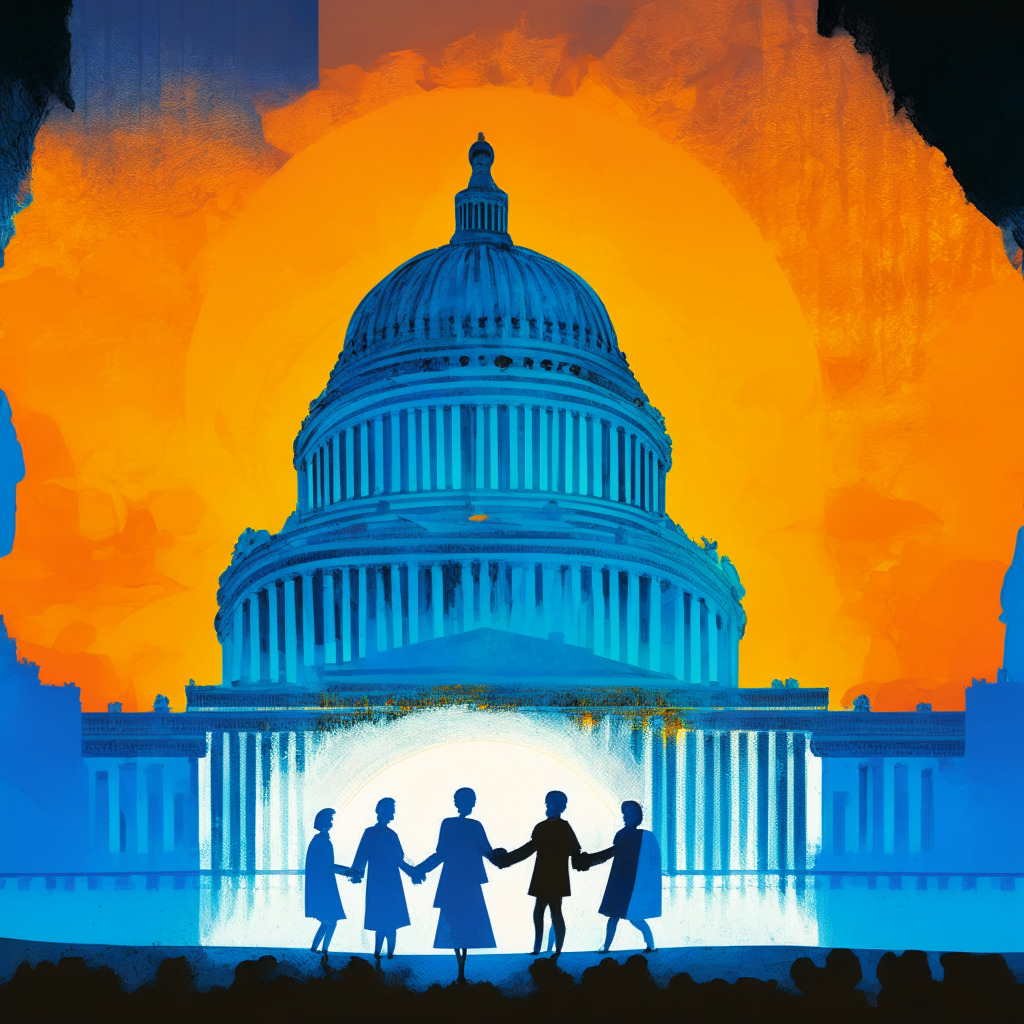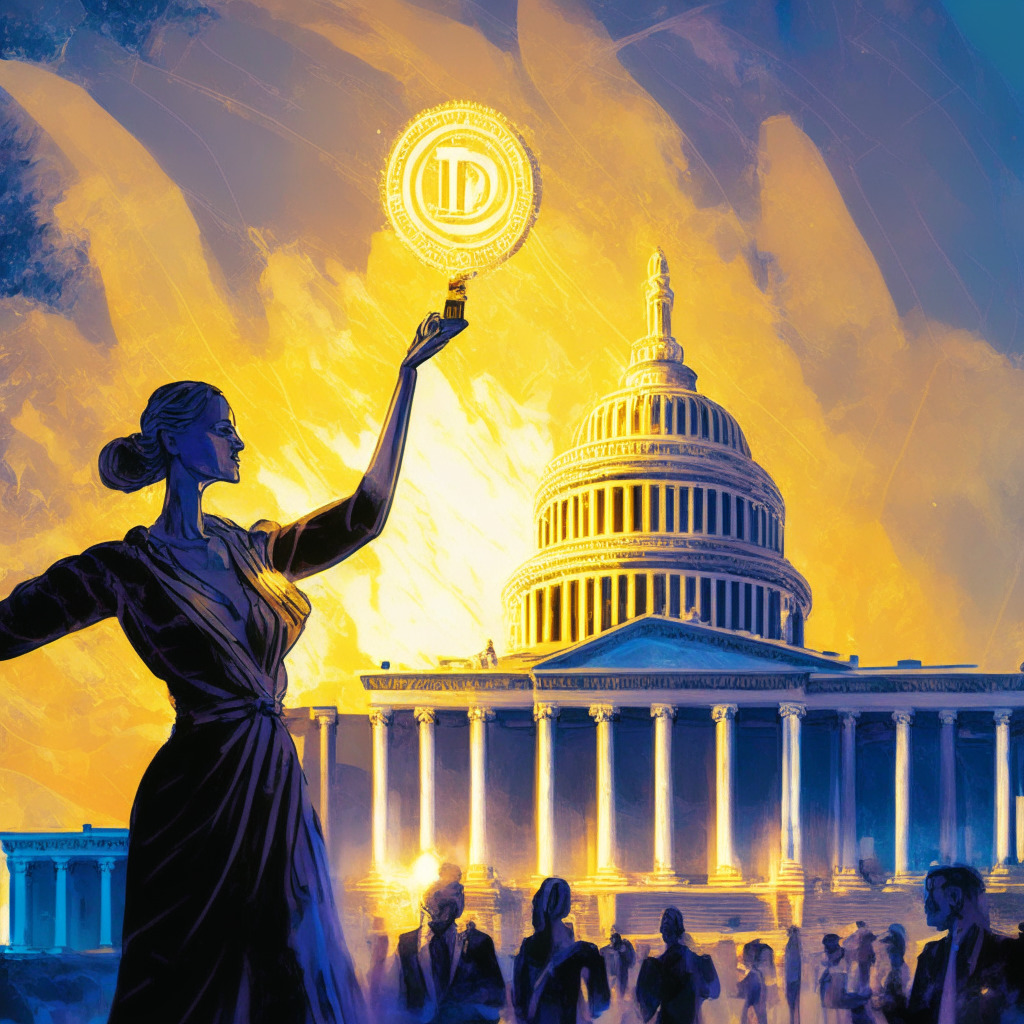Democratic Senators, including Elizabeth Warren and Bernie Sanders, urged the IRS and the Treasury Department to expedite new crypto tax regulations to close a potential “$50 billion crypto tax gap.” They expressed concerns about potential loss of $1.5 billion in government tax revenue for 2024 due to delay in the implementation. This is amid a wider conversation for more transparency in the bourgeoning cryptocurrency sector.
Search Results for: Republican
MIT’s PARSEC: Enhancing CBDCs or Inviting Government Control?
MIT’s Digital Currency Initiative has revealed an experimental central bank digital currency platform, PARSEC. With its programmability feature, it promises to revolutionize asset backing and decentralization, but concerns about privacy and governmental control remain significant obstacles. Supported by the ERC-20 standard, PARSEC surpasses public blockchains performance, though requires continual enhancements in security and data management.
Navigating Uncertainty: Progress and Hurdles in the U.S. Crypto Regulation Landscape
“Crypto enthusiasts are celebrating progress toward a new U.S. oversight system for digital assets despite uncertainties. The development involves digital assets legislation addressing regulation framework, stablecoins, and crypto-related money laundering. The law guiding crypto operations leaped over two House committees, indicating progress in U.S. crypto regulation.”
Presidential Hopeful’s Take on Bitcoin: Asset, but Not Dollar Stabilizer
Republican Presidential candidate Vivek Ramaswamy, while expressing fondness for Bitcoin, would not consider it as a component to stabilize the U.S. dollar. He believes the U.S. Federal Reserve should focus on maintaining dollar stability against traditional commodities.
Prospective President DeSantis: Halting the War on Crypto and Spurning CBDCs
Presidential hopeful Ron DeSantis pledges to halt the “war on Bitcoin and cryptocurrency” if elected President, criticizing the current administration’s approach to digital assets. DeSantis equates potential US plans for a central bank digital currency (CBDC) to those in China, expressing mistrust over government control of finances and stifling economic freedom.
Crypto Market Flux: Regulatory Tremors, Political Shocks, and IRS Intrusions
The crypto market recently experienced a plunge, with Bitcoin dipping around 2%, amidst political and lawsuit shocks. The SEC has accused Richard Heart, Hex creator, of selling unregistered securities worth $1 billion, causing the HEX price to plummet. This has led to increased anxiety in the crypto community, with investors also watching out for potential regulations. Meanwhile, the IRS has issued a ruling requiring US taxpayers to add crypto staking rewards to their annual income. Despite the challenges, crypto enthusiasts see potential in the top 15 digital assets for 2023, but caution and thorough research are advised.
Campaign Promises and Crypto: How Political Stances May Shape the Future of Bitcoin
Florida Governor Ron DeSantis, during his 2024 presidential campaign, vowed to prohibit central bank digital currencies (CBDCs) and suppress any policy by the current Biden’s administration pertaining to Bitcoin and cryptocurrency regulation. The move has sparked renewed conversations about digital currencies in the political sphere.
Presidential Candidate’s Pro-Crypto Stance: Game Changer or Empty Promise?
Presidential candidate Ron DeSantis’ stance on cryptocurrencies aims to dispel the purported “war on bitcoin and cryptocurrencies” by the current administration. DeSantis’ intent is to allow American citizens the freedom to invest in cryptocurrencies, offering a potential paradigm shift in this sphere.
U.S. Crypto Regulation: Balancing Innovation and Compliance in the Blockchain Era
“The U.S Congress moved closer to regulatory clarity with two crypto-related bills: the Financial Innovation and Technology for the 21st Century Act, aimed at crypto company registrations, and the Blockchain Regulatory Certainty Act, aiming to cut down barriers for blockchain developers. However, potential conflicts between lawmakers and industry operators may lead to strenuous compliance requirements, possibly bringing the crypto industry closer to traditional finance rules and limitations.”
Congressman’s Alleged Crypto-Scam: A Dark Side of Cryptocurrency & Politics Unveiled
U.S Republican Congressman George Santos reportedly tried to involve a donor in a questionable crypto-related investment deal, mimicking a typical scam. This comes amidst his past manipulation allegations and a questionable biography, and yet Santos still holds a congressional seat. His actions highlight the dangerous allure of the unregulated cryptocurrency market.
Cryptocurrency: The Supremacy Race Between U.S and China in the Blockchain Era
In the current era of technological renaissance, the U.S. struggles to keep up with blockchain technology, while China continues to make significant progress with its central bank digital currency. Binance, reportedly handling a majority of global crypto trading volume, faces legal challenges in the U.S. amidst a larger climate of legal obscurity in the crypto industry.
Unmasking the FTX Scandal: Bankman-Fried’s Political Illusion & The Danger of Misinformation
“Sam Bankman-Fried, founder of FTX, is far from escaping his fate with a long list of active charges set to be tried this October. False narratives have portrayed him as a political puppet, but such oversimplified views aid potentially corrupt elites. Despite nuances leading to separate trials, these charges are not likely to vanish, hence increasing his likelihood of conviction.”
Cryptocurrency Crossroads: Santos Scandal Meets RFK Jr’s Bitcoin Vision
“The Santos incident reveals a complex intertwining of political intrigue, crypto manipulation, and scams, while figures like Robert F. Kennedy Jr. demonstrate a supportive stance towards cryptocurrency. This highlights the intersection of politics, regulation, and digital finance in unanticipated ways.”
Wyoming’s Revolutionary Leap: State-backed Stablecoin Project and a Hefty Paycheck Higher than the Governor’s
The US state of Wyoming plans to hire an executive director for a groundbreaking stablecoin project, a commission introduced after the Wyoming Stable Token Act was recently approved. The commission’s authority allows it to issue a US dollar-pegged stablecoin in Wyoming, redeemable for dollars in the state’s bank account. With desired qualifications including blockchain expertise and understanding of Wyoming’s legislative operations, the Commission aims to issue a stablecoin by end of 2023.
Navigating Crypto Legislation: Can the New U.S Federal Regulatory Framework Provide Clarity?
“The Financial Innovation Technology for the 21st Century Act, aimed at establishing a federal regulatory framework for cryptocurrency, has been forwarded to the full House of Representatives. This addresses the current industry confusion caused by a lack of explicit regulations, by providing clarified guidelines for crypto ventures.”
Unraveling the Knots of US ‘Pro Crypto Bill’: Progress and Objections Explained
“The ‘Pro Crypto Bill’ recently advanced from the US House Agriculture Committee, aiming to set a comprehensive regulatory structure for digital assets. While promising for the regulated crypto environment, critics express concerns over its lack of third-party auditing provision and stagnant CFTC funding.”
Stablecoin Policy Disputes: A Milestone or Impediment for Crypto Regulation?
“The Clarity for Payment Stablecoins Act (H.R. 4766) negotiations spark political debate. While some view this potential legislation as crucial for cryptocurrency regulation, others express concern about rushed decisions, lack of oversight, and regulatory dissonance. Rep. Warren Davidson’s ‘Keep Your Coins Act’ also enters the conversation, aiming to protect individual’s self-custodied crypto wallets.”
Sweeping U.S. Regulatory Acts: Crypto Advancement or Investor Risk?
The House Financial Services Committee approves a bipartisan bill, Financial Innovation and Technology for the 21st Century Act, aiming to provide regulatory clarity for cryptocurrencies. The Act delineates registration requirements for crypto firms and seeks to define if a cryptocurrency is a security or a commodity, extending the CFTC’s control over the crypto industry.
Could Bitcoin Decide the Next President? Exploring Cryptocurrency’s Growing Political Influence
“Bitcoin and the crypto community could be deciding factors in a U.S. presidential election. Candidates now need to proclaim their stance on cryptocurrencies. The U.S. Federal Reserve estimates that 8%-11% of the American population, owning cryptocurrencies, can considerably influence the election. Anti-Bitcoin policies may thus, alienate a rapidly growing cohort of voters.”
Balancing Act: How Future Cryptocurrency Regulation Is Spurring Debate and Discord
“Cryptocurrencies are reshaping the global financial landscape. The International Monetary Fund (IMF) is facing challenges as it attempts to regulate them at an international level. Its vision includes competition, legal tender status, integration, and taxation – provoking varying responses and criticism. Despite this, there is increased optimism about the future of cryptocurrency regulation.”
Federal Reserve’s CBDC Hunt: A Financial Death Star or Leap Towards Progress?
“The San Francisco Federal Reserve Bank’s job posting for a “senior crypto architect” has sparked criticism. There are concerns CBDCs could be misused as tools for coercion and control. Representatives like Warren Davidson contend CBDCs should prioritize being a stable store of value and an efficient means of exchange, rather than being used for surveillance and control.”
Rally Against CBDCs: Freedom Fighters or Innovation Obstructors?
U.S. Republican Representative, Warren Davidson, has appealed to Congress to ban Central Bank Digital Currencies (CBDCs), equating their creation to “building the financial equivalent of the Death Star.” Davidson argues that CBDCs convert money into a tool for coercion and control, rather than a stable store of value. Counterarguments maintain that CBDCs represent the natural evolution of digitizing finance. The debate underscores the need for well-regulated, informed approaches to digital finance’s future.
Exploring FedNow’s Implications: An Unintentional Preparation for CBDC or a Privacy Nightmare?
“The U.S. Federal Reserve’s FedNow initiative may inadvertently pave the way for the necessary infrastructure required by a potential CBDC (Central Bank Digital Currency) in the U.S. While not a digital token, it creates a platform that could facilitate this. The prospect has raised fresh concerns over potential surveillance and control around a digital dollar.”
Crypto Market Unravel: Bitcoin Dips Below $30k, Regulatory Challenges Intensify
The cryptocurrency market experienced a significant dip, driven by profit-taking activities. Bitcoin, Solana’s SOL, Ether (ETH), XRP, Cardano’s ADA, and Avalanche’s AVAX all saw considerable reductions. Meanwhile, a new digital assets oversight bill introduced by U.S. House Republicans adds regulatory uncertainty to the sector, while amplified market volatility resulted in over $66 million worth of liquidations in the past 24 hours.
Assessing the Impact of Newly Proposed US Blockchain Regulation Bill
Senior House Republicans proposed a bill called the “Financial Innovation and Technology for the 21st Century Act.” The legislation aims to define “blockchain” and “digital asset” in financial laws, clarify the roles of the CFTC and SEC in cryptocurrency oversight, and establish clear guidelines for classifying digital assets. Despite some opposition, it has substantial backing due to its dual objective of consumer protection and promoting innovation.
Navigating Regulatory Rifts: US Congressional Discourse on the SEC’s Approach to Crypto Regulation
“Bitcoin and blockchain technology’s global influence faces regulatory scrutiny. Skepticism towards the US Securities Exchange Commission’s approach to cryptocurrency regulation is voiced by senior Republican members. Accusations of targeting crypto for publicity rather than comprehensive legislation prompt concerns about customer protection and compliance.”
Unpacking Kennedy’s Bold Bitcoin Backing Proposal: Economic Boon or Bane?
Robert F. Kennedy Jr., a presidential candidate, controversially proposes to back the US dollar with Bitcoin to strengthen the economy and curb inflation. Skeptics voice concerns over Bitcoin’s volatility and potential issues of economic inequality resulting from proposed tax exemptions on Bitcoin-to-dollar conversions.
Bipartisan Agreement on Stablecoin Regulations: A Hopeful Step or Potential Roadblock?
The Republicans and Democrats have found consensus on proposed stablecoin regulations, with the Financial Services Committee targeting state-wise legislations. The bill tasks the US Federal Reserve with enforcing regulations and could give the Commodity Futures Trading Commission more oversight over cryptocurrencies. The state vs federal regulation issue may present future challenges.
The SEC, Ripple and the Flux of Cryptocurrency Regulations: Progress or Pitfall?
The SEC’s review of its stance on Ripple and other digital currencies has left the future of cryptocurrency regulation uncertain. With some exchanges relisting Ripple, questions arise about setting precedents for future cases. However, the SEC continues to exercise caution, acknowledging the need for tailored rules for crypto, and the importance of protecting investors.
Ripple Case Verdict: A Call for Clear Crypto Regulations and its Impact on the Industry
“The recent court ruling established that the Ripple-associated token XRP should not be considered a security. This highlights an urgent need for Congress to establish a clear regulatory framework for digital assets. Regulatory strides could unlock economic growth and enhance financial inclusivity, but the full potential of the crypto industry depends on well-thought-out regulations and proactive policymaking.”
SEC’s Blow in Ripple Case: Precedent Shift in Crypto Regulation Landscape
The SEC’s strategy of regulating cryptocurrencies through enforcement may be at risk following a judge’s ruling against Ripple’s XRP. Congress is crafting legislation to regulate cryptocurrencies, potentially resulting in a regulatory framework more accommodating to crypto growth. Future court rulings mirroring the Ripple case could further diminish the negotiating position of anti-crypto players.
Navigating Crypto Regulations: The SEC-Prometheum Controversy & Future of Digital Assets
“Congressman Ritchie Torres has raised concerns about a ‘sweetheart deal’ between the United States Securities Exchange Commission (SEC) and Prometheum, a digital assets platform. Torres highlights the SEC’s lack of transparency in the handling of digital assets law enforcement and its supposedly failed process of registering digital asset platforms.”































